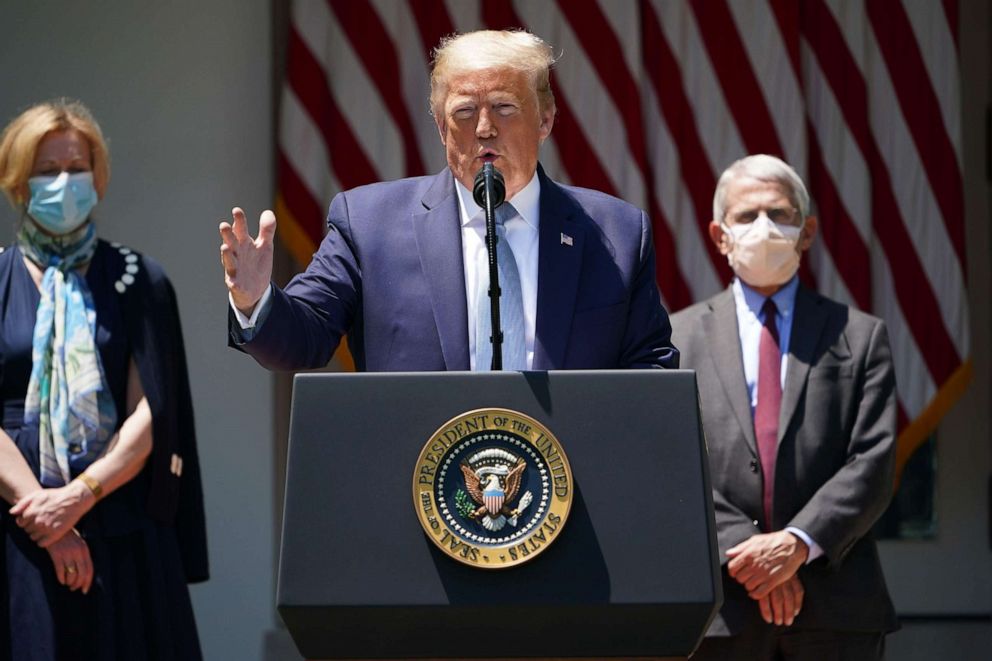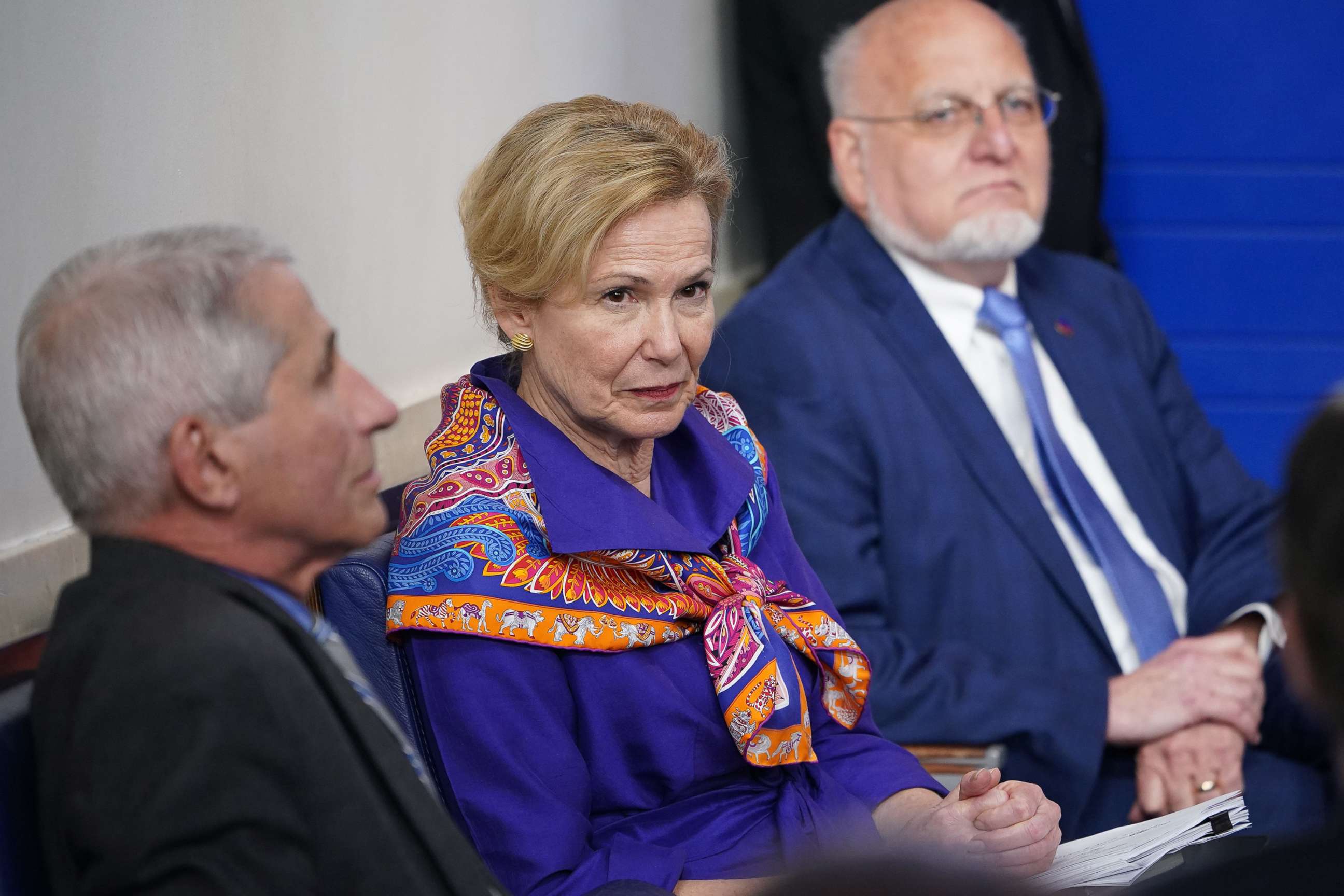President Trump's split with health advisers on coronavirus fuels speculation of shake-up
CDC Director Redfield said he's committed to an agency "grounded in data."
As the novel coronavirus tightens its grip on the nation, President Donald Trump is insisting that Americans are ready to move past the crisis -- a message almost entirely at odds with his own top health advisers, who continue to warn the toughest months lie ahead.
The fractured messaging has invited speculation that if Trump is reelected he would consider purging political appointees at the federal agencies leading the nation's response to the virus in favor of loyalists who share his worldview.
"We're doing very well with respect to making the turn on the pandemic," Trump declared again on Friday, comments he made last April and again in July, even as death rates have climbed. He later added that the corner would be rounded without the vaccine.
"You know, without it, we're still rounding the corner," he told a crowd in Michigan. "We have [a vaccine]. But without it, we'll round the corner."
Just days earlier, Adm. Brett Giroir, Trump's appointee to coordinate COVID testing and a member of the White House coronavirus task force, said something entirely different.
"I just want to be straight with the listeners that we are not going to completely defeat the virus until we get a vaccine, and that vaccine is distributed to the American people," Giroir told reporters on a press call. "And we build up herd immunity in the appropriate way by getting a vaccine."
When asked if Trump is considering shaking up his appointees in another term, White House deputy press secretary Brian Morgenstern would only say that Trump and the task force have been working together to end the pandemic since the beginning.
"Their actions have ensured that our country will defeat the virus and safely reopen," he said.

As Trump stares down a potential four more years in the White House, the president is clearly ready for a reset after months of the virus dragging down the economy and frightening voters. When he speaks about the virus on the trail, it's almost entirely on political terms -- insisting Democrat Joe Biden would shutter the country and destroy the economy while teasing mask wearers as "politically correct."
While his top advisers deliver an entirely different message -- that the country is at a dangerous tipping point and that masks and social distancing are the best available option -- the question then becomes what Trump will do with his own federal task force on coronavirus after the election, especially if he is reelected.
Dr. Deborah Birx, who is in charge of coordinating the task force, no longer briefs the public from the White House and has instead been doing her job almost entirely from the road, visiting state houses and meeting with local health officials. Dr. Robert Redfield, director of the Centers for Disease Control and Prevention, and Health Secretary Alex Azar, both members of the task force, held a rare press conference at CDC headquarters in Atlanta last week to sound the alarms.
"The pandemic is not over," Redfield declared.
Citing several administration sources, The Washington Post reported on Friday that Redfield is expected to leave or be asked to resign shortly after the election, no matter the result. ABC News could not immediately confirm the report.
In a statement to ABC News, Redfield praised the agency workforce, adding, "I will do everything in my power to support them as I maintain my commitment to lead this agency grounded in data, science, and public service."
Another open question is the fate of Stephen Hahn, the head of the U.S. Food and Drug Administration, which will decide when a vaccine is ready for public consumption. He reportedly provoked the ire of the White House this month when he insisted upon tough new guidance for vaccine makers to ensure their vaccines are safe. The White House dropped their objection.
Trump tweeted at Hahn earlier this month, calling his regulatory decision a "political hit job."
"New FDA Rules make it more difficult for them to speed up vaccines for approval before Election Day. Just another political hit job! @SteveFDA," Trump tweeted.
Hahn never responded directly to the president, but continues to defend his work.
"We're not going to rush something that's so important to get right. There will be no shortcuts to our standards for product quality, safety, and efficacy," Hahn tweeted this week.
Trump has often relied on advisement from radiologist Scott Atlas from Stanford's Hoover Institute. Atlas advocates for the idea of allowing the virus to spread rapidly among healthy populations while shielding more vulnerable groups -- an idea that the nation's top public health experts say is nearly impossible and would result in unacceptable death tolls.
Dr. Anthony Fauci, the nation's top infectious disease expert and director of the National Institute of Allergy and Infectious Diseases, has repeatedly shot down the idea of trying to embrace "herd immunity" without a vaccine as "nonsense."
He warned this week the nation could be on track to hit 100,000 cases a day and half a million deaths by February unless the country takes the virus more seriously.

As a career employee who has served across multiple administrations, Fauci could not be pushed out easily by Trump.
"We've got to work together as a country. We've all got to be on the same page; we've got to pull together to do something about this," he said in an interview this week with Rolling Stone editor Jeff Goodell.
The split viewpoints come as the numbers in the U.S. are grim. There are 43 states and territories on an upward trajectory with cases, while a quarter of the nation's hospitals report that 80% of beds in intensive care units are filled.
On deaths -- the same day Donald Trump Jr. claimed the number fell to "almost nothing" -- 1,049 Americans died due to complications from COVID-19.
Public health officials tracking the epidemic say the total number of deaths -- at least 229,293 as of Friday afternoon -- is likely undercounted because many cases probably aren't being reported and people are going undiagnosed.
According to the CDC, the U.S. experienced more than 299,000 excess deaths this year compared to mortality rate in prior years.




